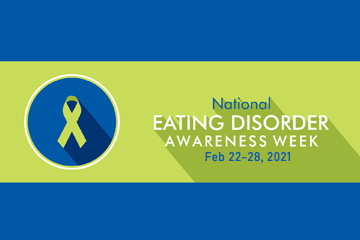Each year, National Eating Disorders Awareness (NEDA) Week begins the last Monday in February. This year, the NEDA Week runs from February 22-28. The week is observed all over the nation to spread awareness about eating disorders by educating the public and sharing inspirational stories of hope and recovery. Sponsored by the National Eating Disorder Association (NEDA), this year’s theme is “Every Body to Have a Seat at the Table”. NEDA is dedicated to preventing eating disorders, providing treatment referrals, and increasing education and understanding about eating disorders, weight, and body image.
Single Care defines eating disorders as serious mental health problems, signifying a person’s unhealthy relationship with food. The causes of these disorders include the effects of another mental illness, genetics, media, negative body image, and trauma. People with eating disorders have repetitive thoughts about food, their body weight or shape, and body image.
Anorexia nervosa, binge eating disorder, and bulimia nervosa are most common eating disorders. Other conditions include avoidant/restrictive food intake disorder (ARFID), pica, night eating syndrome and other specified feeding or eating disorder (OSFED). NEDA reports that national surveys estimate that 20 million women and 10 million men in America will have an eating disorder at some point in their lives.
Common symptoms of eating disorders like anorexia nervosa include extremely restricted eating, intense fear of gaining weight, chronically inflamed and sore throat, skipping meals, expressing depression, disgust, shame or guilt about eating habits, staying away from normal social activities or purging behaviors like vomiting or over-exercising. On the other hand, bulimia nervosa and binge eating disorder are characterized by extreme overeating followed by purging.
Without treatment, eating disorders can affect the body’s ability to get proper nutrition and lead to health issues such as heart and kidney problems, and even death.
The best way to overcome an eating disorder is professional treatment. Such complex mental health conditions often require combinations medical and psychological the interventions to alter their course. Without proper treatment, risks for medical complications, suicide or co-occurring disorders would be high. Treatment plans are tailored to individual needs and may include –
- Individual, group, and/or family psychotherapy including cognitive behavioral approaches
- Medical care and monitoring the complications that eating disorders can cause
- Nutritional counseling to reach and maintain a healthy weight
- Medications such as antidepressants, antipsychotics, or mood stabilizers
Eating disorder are more common in women and can frequently appear during the teen years or young adulthood. Increasing awareness through campaigns like National Eating Disorders Awareness Week will help early detection and intervention, which improves the likelihood of full recovery for millions.
